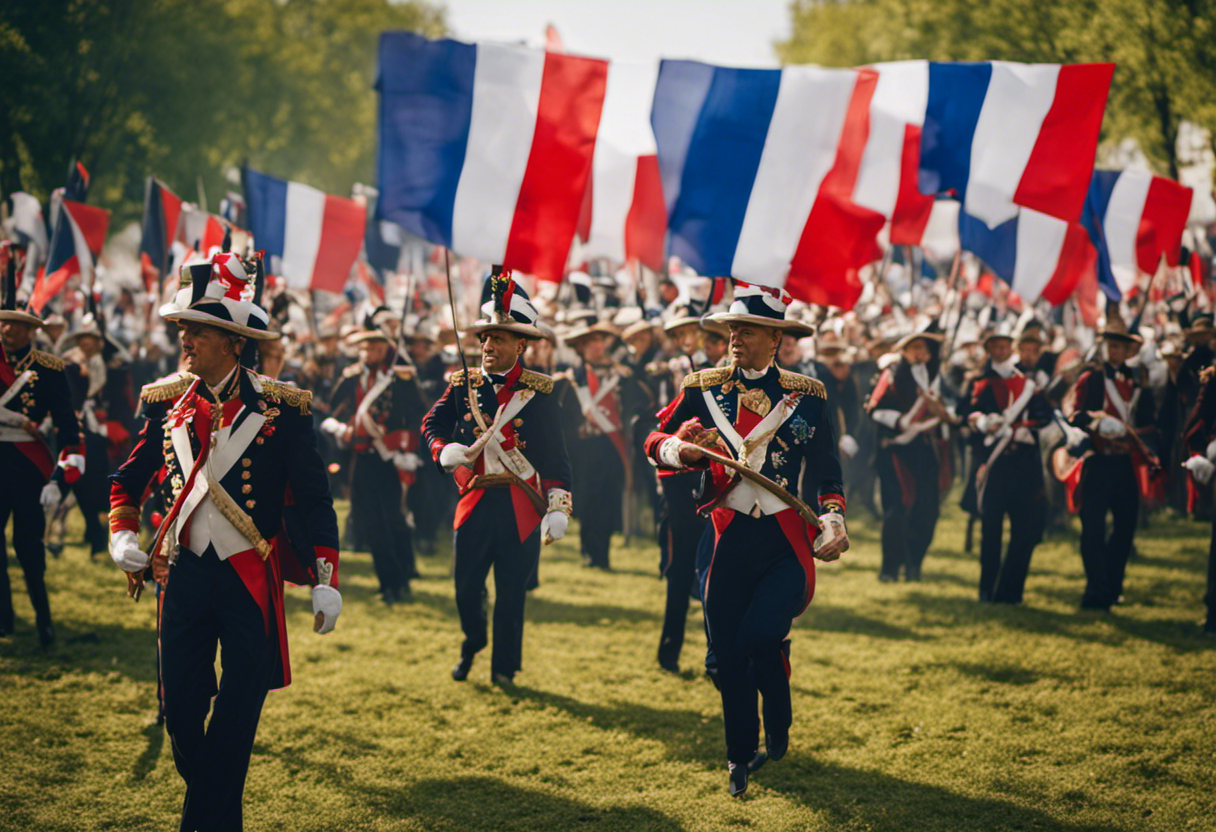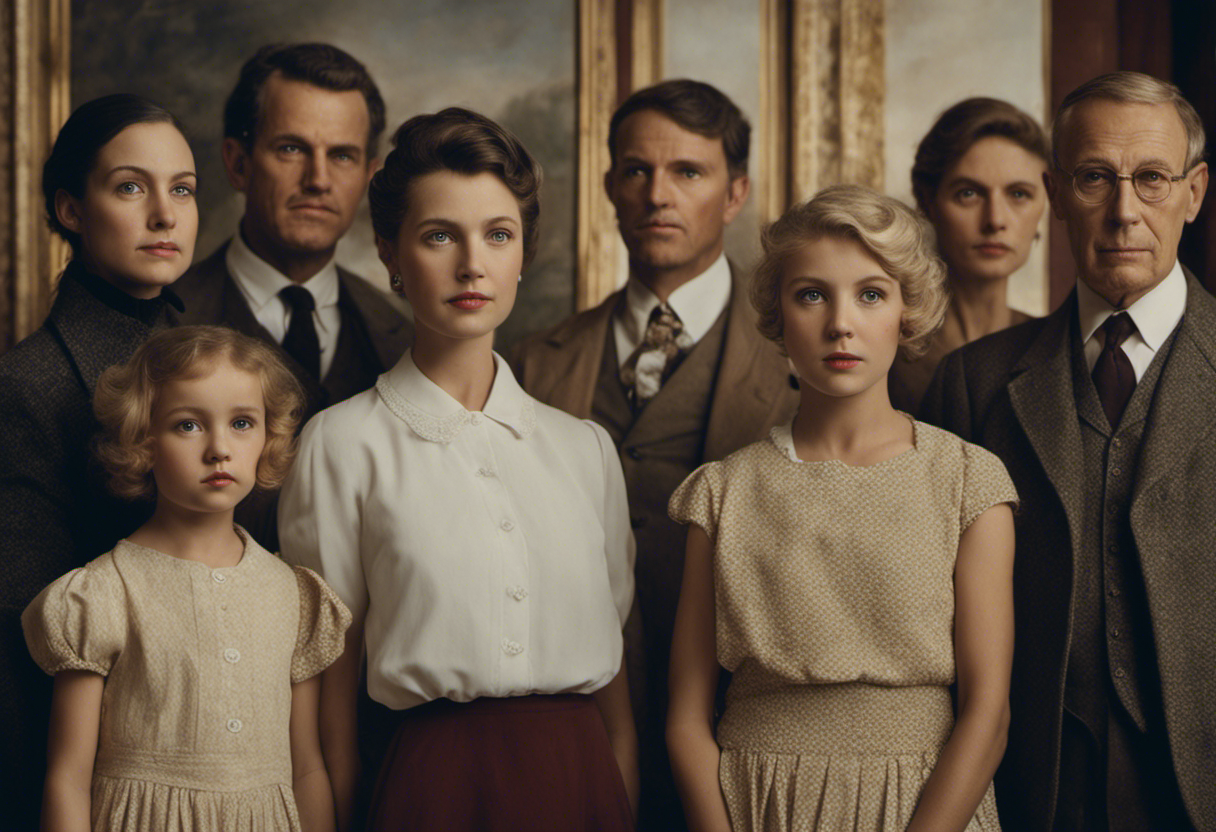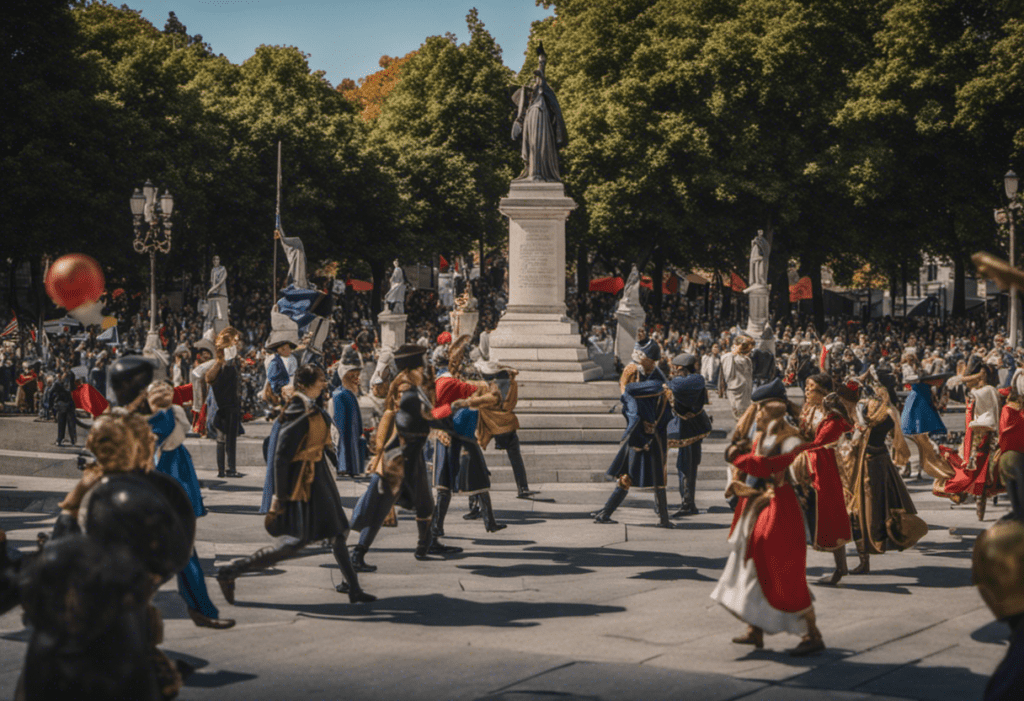While the French Republican Calendar is often dismissed as a failed experiment, its cultural impact cannot be overlooked. Critics argue that the calendar’s attempt to reshape timekeeping and redefine holidays was a futile endeavor.
However, a closer examination reveals that the Republican Calendar had a lasting influence on French society. This article explores the adoption of the calendar, its transformation of daily life, and its enduring legacy in modern France.
By analyzing evidence and examining its effects, we can gain a deeper understanding of this often overlooked aspect of French history.
Key Takeaways
- The implementation of the Republican Calendar during the French Revolution aimed to establish a more rational and egalitarian system by introducing new names for days and months and replacing the traditional seven-day week with a ten-day week known as the décadi.
- The transformation of daily life and timekeeping led to a reorganization of work schedules, with workers having more frequent days of rest. Some argued that this increased efficiency and improved the quality of life.
- The French Republican Calendar redefined French holidays and celebrations, replacing traditional religious holidays with secular ones that reflected revolutionary ideals. Existing holidays were renamed and rescheduled to align with the new values, resulting in a shift in cultural practices as people adapted to the new calendar.
- The adoption of the Republican Calendar had a profound impact on cultural identity and social implications. It severed ties with traditional aristocracy through name changes, affected individuals’ sense of belonging and cultural identity, and had economic and political consequences. It also transformed urban landscapes through the renaming of streets and buildings. The calendar’s influence remains in art, literature, and the continued presence of festivals and celebrations that reflect its legacy in modern French society.
Adoption of the Republican Calendar in French Society


The adoption of the Republican Calendar in French society had a profound impact on the nation’s cultural and social fabric. One of the key areas affected by this new calendar was the transformation of work schedules. The Republican Calendar, implemented during the French Revolution in 1793, aimed to break away from the traditional Gregorian calendar and establish a more rational and egalitarian system.
As part of this shift, the Republican Calendar introduced new names for the days and months, with each month consisting of three ten-day weeks. This transformation of work schedules had both positive and negative implications. On one hand, the new calendar aimed to create a more balanced and efficient work-life schedule, with each day of the week having an equal number of working days. This was in contrast to the previous calendar, where Sundays were designated as a day of rest.
On the other hand, the new calendar disrupted established routines and traditions, causing confusion and resistance among the population. Furthermore, the adoption of the Republican Calendar also had a significant impact on religious practices. The calendar sought to secularize society and distance itself from religious influences. This was evident in the renaming of months and the removal of religious holidays. Instead, the calendar introduced new commemorative days, such as the Festival of Virtue and the Festival of Agriculture.
Transformation of Daily Life and Timekeeping


Daily life underwent a significant transformation with the adoption of the Republican Calendar, as well as a revolution in timekeeping. The introduction of the Republican Calendar brought about changes in work schedules, impacting various aspects of daily life. The calendar abolished the traditional seven-day week and replaced it with a ten-day week, known as the décadi. This led to a reorganization of work schedules, with workers now having more frequent days of rest. The transformation of work schedules had a profound impact on productivity and labor conditions, with some arguing that it increased efficiency and improved the quality of life for workers.
Additionally, the Republican Calendar had a significant impact on religious practices. The calendar sought to eliminate religious influence on society and promote a secular state. As a result, religious holidays and observances were replaced with new civic celebrations, such as the Festival of Reason and the Festival of the Supreme Being. These new celebrations aimed to promote civic virtues and values, emphasizing the importance of the state and the collective over religious beliefs. The transformation of religious practices reflected the broader cultural and ideological changes taking place during the French Revolution, as the government sought to redefine the role of religion in society.
Redefining French Holidays and Celebrations


The adoption of the French Republican Calendar not only transformed the way time was measured and organized, but also redefined the French holidays and celebrations.
This new calendar introduced new holiday traditions that reflected the revolutionary ideals, such as the celebration of Virtue and Genius.
Additionally, the renaming and rescheduling of existing holidays aimed to emphasize historical significance and align with the new republican values.
As a result, the French people witnessed a shift in cultural practices, as they adapted to the new calendar and its associated holidays.
New Holiday Traditions
One significant consequence of the French Republican Calendar was the reimagining of holiday traditions and the introduction of new commemorative events. This calendar aimed to create a new sense of national unity and cultural assimilation by replacing traditional religious holidays with new secular ones.
The following are four examples of new holiday customs that emerged during this time:
- Festival of Reason: This holiday replaced Christmas and celebrated reason as the foundation of the new republic. It included processions, speeches, and the worship of the goddess of Reason.
- Festival of the Supreme Being: Created by Robespierre, this holiday celebrated the belief in a higher power and aimed to replace Catholicism. It included ceremonies, parades, and the worship of the Supreme Being.
- Festival of Liberty: This holiday celebrated the ideals of liberty and freedom. It included street parties, feasts, and public gatherings to commemorate the values of the revolution.
- Festival of Agriculture: This holiday celebrated the importance of agriculture in the new republic. It included agricultural exhibitions, fairs, and competitions to promote farming and rural life.
These new holiday traditions not only reflected the changing ideology of the French Revolution but also aimed to create a sense of national identity and unity among the citizens.
Historical Significance Explained
An understanding of the historical significance of the French Republican Calendar lies in its profound impact on the redefinition of French holidays and celebrations.
The adoption of the calendar system during the French Revolution brought about significant changes in daily routines, which in turn influenced the way holidays and celebrations were observed.
The Republican Calendar aimed to break away from the traditional religious calendar and create a more secular and rational system.
This led to the renaming and restructuring of holidays to align with the new values of the revolution.
For example, traditional religious holidays like Christmas and Easter were replaced with new celebrations such as the Festival of Reason and the Festival of the Supreme Being.
The Republican Calendar thus played a crucial role in reshaping French culture and society during this transformative period in history.
Shift in Cultural Practices
As a result of the implementation of the French Republican Calendar, significant changes occurred in cultural practices, particularly in the redefinition of French holidays and celebrations. The transformation of cultural practices brought about by the calendar can be seen in the following ways:
- Renaming of holidays: The French Republican Calendar aimed to replace religious holidays with secular ones. This led to the renaming of traditional holidays, such as Christmas and Easter, to more neutral names like ‘Winter Celebration’ and ‘Spring Festival.’
- Shift in focus: The new calendar emphasized the celebration of nature, reason, and civic virtues. Holidays were redefined to reflect these values, with events like the Festival of the Supreme Being and the Feast of Agriculture becoming prominent.
- Abolition of religious festivals: The calendar sought to eliminate religious influences on cultural practices. As a result, religious festivals such as All Saints’ Day and Corpus Christi were abolished, and new secular celebrations took their place.
- Changes in traditions: The French Republican Calendar brought about changes in traditional customs and practices associated with holidays. For example, traditional religious processions and rituals were replaced with civic parades and ceremonies.
These societal changes reflect the significant impact of the French Republican Calendar on French cultural practices, highlighting the shift towards a more secular and civic-oriented society.
Impact on Personal Names and Identity


The implementation of the French Republican Calendar led to significant changes in personal names as individuals were encouraged to adopt new names that reflected the ideals of the Revolution.
This renaming process aimed to sever ties with the traditional aristocracy and signify a break from the past.
Consequently, the adoption of new names had a profound impact on individuals’ cultural identity and their sense of belonging within the new republican society.
Name Changes and Adaptation
Name changes during the adoption of the French Republican Calendar had a profound impact on individuals’ sense of identity and belonging. The calendar aimed to revolutionize society by replacing traditional Gregorian names with new ones that reflected the ideals of the French Revolution. This change had several implications:
- Impact on education: The renaming of months and days meant that individuals had to learn a new system, which affected their understanding of time and the organization of their daily lives. This had significant implications for education, as schools had to adapt their curriculum to incorporate the new calendar.
- Influence on fashion: The French Republican Calendar also influenced fashion, as people sought to align their appearance with the revolutionary ideals. Clothing and accessories were designed to reflect the new calendar, with motifs and symbols representing the new names of months and days.
- Sense of identity: The change in personal names meant that individuals had to let go of their traditional identities and adopt new ones. This had a psychological impact on individuals, as they had to redefine their sense of self and their place in society.
- Social cohesion: The adoption of new names aimed to create a sense of unity and equality among citizens. By erasing traditional names associated with the monarchy and aristocracy, the French Republican Calendar sought to level the social hierarchy and foster a sense of belonging among the populace.
Cultural Identity Transformation
The adoption of the French Republican Calendar led to a profound transformation in individuals’ cultural identity, particularly in relation to their personal names and sense of self. This transformation can be understood through the lens of cultural assimilation and societal resistance.
The French Republican Calendar aimed to create a new sense of national unity and break away from the traditional religious and monarchical associations of the Gregorian calendar. As part of this transformation, individuals were encouraged to change their personal names to reflect republican values and ideals.
While some individuals embraced these changes willingly, others resisted, clinging to their traditional names as a form of cultural resistance. This tension between assimilation and resistance highlights the complexities of cultural identity transformation during this period and the deeply personal nature of names and identity.
Social Implications of Renaming
The renaming of individuals’ personal names during the adoption of the French Republican Calendar had significant implications for their social identities and sense of self. This act of renaming was not merely a change in nomenclature, but rather a deliberate attempt to break ties with the old regime and establish a new social order.
Here are four social implications of this renaming process:
- Loss of familial and historical connections: The adoption of new names meant severing ties to one’s family history and ancestral lineage, causing a loss of identity and connection to the past.
- Economic consequences: The renaming process led to confusion and difficulties in legal and economic transactions. Many individuals faced challenges in proving their identities and establishing their creditworthiness, resulting in economic hardships.
- Political implications: The renaming of personal names served as a means of political control and surveillance. It allowed the government to monitor and regulate the population, reinforcing its authority and control over individuals’ lives.
- Fragmentation of social cohesion: The renaming process disrupted social relationships and community bonds. It created divisions within families and communities, as individuals were forced to adopt new names that did not necessarily reflect their social networks or affiliations.
Renaming of Streets and Buildings


The transformation of urban landscapes was a significant consequence of the French Republican Calendar’s influence, as streets and buildings underwent notable alterations in nomenclature. The renaming of streets and buildings was a deliberate attempt to eradicate the symbols and associations of the old regime and establish a new revolutionary identity. The impact on the urban landscape was profound, as familiar landmarks were renamed to reflect the new revolutionary ideals.
However, the renaming of streets and buildings was not without resistance. Many citizens, particularly those who were loyal to the monarchy or had a personal connection to the old names, opposed the changes. They saw it as an attempt to erase their history and heritage. Some even went as far as secretly referring to the old names in defiance of the new system. The resistance to renaming was an indication of the deep attachment people had to their local identities and traditions.
Despite the resistance, the renaming of streets and buildings ultimately succeeded in reshaping the urban landscape and promoting the ideals of the French Republic. It helped to create a sense of unity and shared purpose among the citizens. The new names served as constant reminders of the new values and aspirations of the revolutionary era. The impact of this renaming can still be seen today, as many streets and buildings in France continue to bear the names given to them during the French Republican Calendar period.
Legacy of the French Republican Calendar in Modern France


Moreover, its influence can still be observed in various aspects of modern French society. The legacy of the French Republican Calendar continues to impact France today, particularly in the adoption of new festivals and its influence on art and literature. Here are four key ways in which the calendar’s legacy can be seen:
- Festivals: The French Republican Calendar introduced new festivals and celebrations that are still observed today. For example, the Bastille Day celebrations on July 14th commemorate the storming of the Bastille prison, a significant event during the French Revolution. This festival reflects the calendar’s emphasis on revolutionary ideals and the commemoration of historical events.
- Art: The French Republican Calendar had a profound influence on art, with many artists incorporating its symbols and themes into their works. Paintings and sculptures often depicted allegorical figures representing the calendar’s months and seasons. This artistic representation helped to popularize the calendar and its ideals among the general public.
- Literature: The French Republican Calendar also left its mark on literature. Many writers and poets referred to the calendar’s months and days in their works, using them as symbolic markers of time or to evoke a sense of revolutionary fervor. This literary influence further cemented the calendar’s significance in French culture.
- Cultural Identity: The French Republican Calendar has become a part of France’s cultural identity, representing the country’s revolutionary heritage and commitment to values such as liberty, equality, and fraternity. Its continued presence in modern French society serves as a reminder of the nation’s tumultuous past and its ongoing pursuit of democratic ideals.
Conclusion
In conclusion, the French Republican Calendar had a profound cultural impact on French society. It transformed daily life and timekeeping, redefined holidays and celebrations, and even influenced personal names and identity.
The renaming of streets and buildings further solidified its legacy. One anecdote that illustrates the calendar’s impact is how it replaced the traditional seven-day week with a ten-day week, disrupting the rhythm of people’s lives and challenging their sense of time.
This metaphor highlights the profound societal changes brought about by the Republican Calendar.




